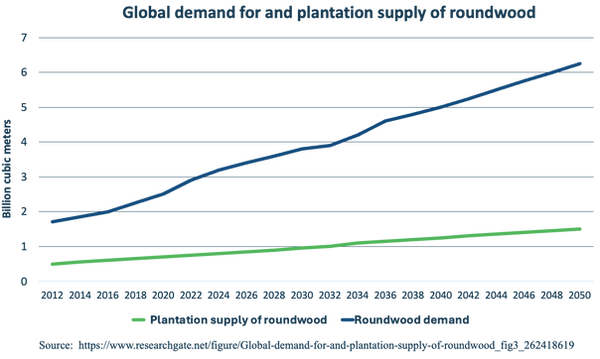
PAULOWNIA
BIO INNOVATION
FUND (PBIF)
Europe‘s Largest Paulownia
Carbon Farming Project
INVESTMENT CASE
Objective and Approach
-
CO₂ Removal and Timber Production: PBIF invests in Paulownia tree short-rotation coppice plantations, absorbing carbon while producing high-value timber.
-
Dual Revenue Streams: Generates income through timber sales and issuance of CO₂ certificates.
Investor Needs
-
Carbon credit certificates are marketable for offsetting carbon footprints or retained forsustainable portfolios.
-
Diversification in investment portfolios with inflation protection and low correlation to other asset classes.

Market Opportunities
Timber Market
-
Market Size: Global timber and wood product market expected to
grow through 2050. -
In 2025, the global timber and wood products market is expected to reach about $1.03 trillion, with annual growth of around 6% driven by high demand in construction, furniture, and packaging, along with sustainability trends. Prices are projected to remain elevated due to strong demand and limited supply. (Sources: Grand View Research, Customcy.com, The Business Research Company)

CO₂ Credit Market
-
Demand for CO₂ Offsetting: With regulatory pressures and the drive for global climate neutrality, demand for CO₂ credits is rising.
-
Forecasts: Market value of carbon credits projected to reach
$1.6 trillion by 2028. -
Projections: ~$750–900bn in 2025, rising to $1.6tn by 2028 (based on leading market research CAGR estimates).

PBI FUND STRUCTURE
Structure and Strategy
-
Fund Structure: A closed-end fund aimed at institutional investors, targeting European Paulownia plantations for carbon credits and timber.
-
Investment Strategy: Leasing land and invest in trees and operation of plantations to create sustainable revenue from timber sales and carbon certificates.
-
Target Returns: 20% IRR with a multiple on invested capital (MOIC) of 3.5.
Sustainability and ESG
-
EU Taxonomy Compliance: Fund meets stringent EU sustainability standards.
-
Classified and assessed as an SFDR Article 9 ESG fund.

Biodiversity & Sustainability Goals
Biodiversity
-
No monocultures: All plantations are designed as mixed, multifunctional ecosystems.
-
Intercropping: Combines Paulownia with crops to diversify land use and strengthen ecosystems.
-
Silvopastoral systems: Integrates livestock for soil enrichment and balanced land management.
-
Habitat creation: Light canopy enables undergrowth, pollinators, and beneficial species.
-
Soil & water services: Deep roots improve fertility, prevent erosion, and stabilize hydrology.

Sustainibility
-
All relevant SDGs: Projects are globally aligned with UN sustainability goals.
-
SDG 13 – Climate Action: Certified CO₂ sequestration ensures measurable climate impact.
-
SDG 15 – Life on Land: Intercropping and silvopastoral diversity enhance ecosystems.
-
SDG 8 – Decent Work: Regional jobs and fair value chains strengthen local economies.
-
SDG 17 – Partnerships: Independent monitoring builds trust through strong collaborations.
-
ISO 14064-2: Verified certification standard guarantees transparency and credibility.
-

RISK MANAGEMENT
Risk Management
-
Prosperise Capital systematically identifies and prioritizes risks using targeted strategies (avoidance, transfer, acceptance) with continuous monitoring.
-
Our collaboration partner, bio innovation park Rheinland e.V., applies its agronomic expertise to address site- and cultivation-specific challenges.
-
In partnership with the University of Bonn, bioIP integrates advanced scientific insights to further enhance risk mitigation and ensure project resilience.
TEAM AND PARTNERSHIPS
Experienced Management
-
Prosperise Capital LLP: 18 years of experience in London, Milan, and Miami; specialized in funds and managed accounts.
-
Leadership: Team combines expertise in forestry, carbon markets, and long-term financial assets such as CDOs, NPLs, and Direct Lending.
-
Plantation Management: Prosperise Capital established Prosperise Forestry Management as a fully owned subsidiary to independently manage forestry operations, ensuring separation from asset management.
-
Scientific and Professional Partnerships
-
bioIP Network (Germany): Non-profit network for bioeconomy and green technologies, founded in 2015 with University of Bonn, 2 universities, 50 companies, 3 municipalities.
-
University of Bonn: Scientific partner of bioIP for all agricultural projects; since 2008 leading Paulownia research under Prof. Dr. Ralf Pude, Europe’s foremost Paulownia scientist.
-
ReCO₂Cert Paulownia Carbon Standard: Developed by bioIP; standard for high-quality carbon removals and the projects in which they are generated, ISO 14064-2 certified.
-
Transparency & Returns: Independent environmental auditors and a public project registry ensure credibility, security, and profitability.
-
PAULOWNIA TREE & PLANTATION
PAULOWNIA TREE
-
Paulownia trees exhibit rapid growth, reaching up to a 30 cm trunk diameter in about 7 years while effectively sequestering CO₂ due to their high photosynthetic rate.
-
Their exceptional adaptability to various climates, high drought tolerance, and robust root system make them ideal for short rotation plantations that enable precise, certified CO₂measurement, optimize water use, and enhance soil structure.
-
Their versatile, lightweight, and stable wood delivers both ecological synergies and economic benefits by serving diverse industrial applications and promoting regional value creation.
Plantation
-
Target area: European Union. Initially 4,000 hectares with a density of up to 1,250 trees per hectare. This plantation is expected to sequester approximately 1.5 million tons of CO₂ over a 10-year rotation cycle.


CONTACT INFORMATION
About Prosperise Capital
Prosperise Capital, founded in London in 2009, is a global asset manager specializing in alternative investment strategies. Prosperise Capital is authorized and regulated by the Financial Conduct Authority (FCA) in the UK and is a registered investment advisor with the state of Florida, US.
We have offices in London (UK), Milan (Italy), and Miami (Florida, US)
Location
Prosperise Capital
1 Knightsbridge Green
London, SW1X 7QA
UK
Email: sales@prosperisecapital.com
Tel.: +44 (20) 7959 1200
Website: www.prosperisecapital.com























